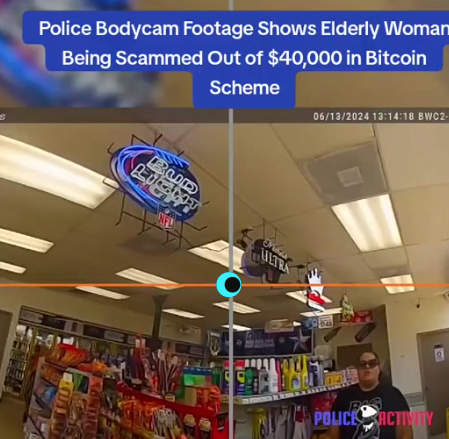In a shocking case of financial exploitation, police bodycam footage has revealed the heartbreaking moment an elderly woman was scammed out of $40,000 through a sophisticated Bitcoin scheme. The incident highlights the growing epidemic of digital fraud targeting vulnerable seniors across the country.
The footage, recorded in a convenience store, shows the distressed woman speaking with officers after realizing she had been tricked into sending thousands of dollars to scammers. According to authorities, she had been contacted by fraudsters posing as government officials. They convinced her that her money was at risk and needed to be “secured” through Bitcoin transfers — a tactic increasingly used to exploit those unfamiliar with cryptocurrency.
For hours, the scammers manipulated her, using fear and urgency to keep her from questioning their demands. Believing she was protecting her life savings, the woman followed their instructions, purchasing Bitcoin and transferring it to the scammer-controlled wallet. By the time police intervened, it was too late — the money was gone, unrecoverable in the anonymous world of cryptocurrency transactions.
The bodycam footage captures the emotional toll. The woman’s voice trembles as she explains what happened, clutching receipts and looking overwhelmed. Officers reassure her while also acknowledging the painful truth: recovering stolen cryptocurrency is nearly impossible. “These criminals know exactly what they’re doing,” one officer can be heard saying. “They target good people like you because they know you’ll trust them.”
Authorities report that scams like this are on the rise, with billions lost each year to cryptocurrency-related fraud. Seniors are often prime targets, as scammers exploit their trust, lack of familiarity with digital technology, and fear of losing their financial security. In many cases, victims are threatened with legal action, arrest, or even harm to their loved ones if they don’t comply.
The incident has sparked outrage online, with many expressing heartbreak for the victim. “Forty thousand dollars is someone’s entire life savings — it’s devastating,” one commenter wrote. Others shared similar stories of elderly relatives being targeted, calling for stronger protections and awareness campaigns.
Experts advise that education is the strongest defense against scams. Red flags include unsolicited calls demanding urgent action, requests for payment through gift cards or cryptocurrency, and threats of arrest if instructions are not followed. Officials stress that no legitimate government agency or bank will ever demand money in Bitcoin.
Police have urged families to check in regularly with elderly loved ones and to openly discuss scam tactics so they are prepared if contacted. “A five-minute conversation could prevent a lifetime of regret,” one officer explained.
While the woman in this case may never recover her $40,000, her story is now serving as a powerful warning for others. By sharing the footage, authorities hope to prevent future victims from falling into the same trap.
At its heart, this story is about vulnerability and awareness. In a world where technology offers new opportunities for criminals, vigilance and education are the keys to protecting those most at risk. For one elderly woman, a devastating scam became a painful lesson — but for others, it may serve as the warning they need to stay safe.
